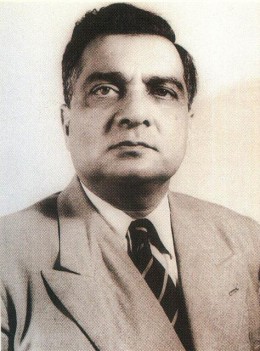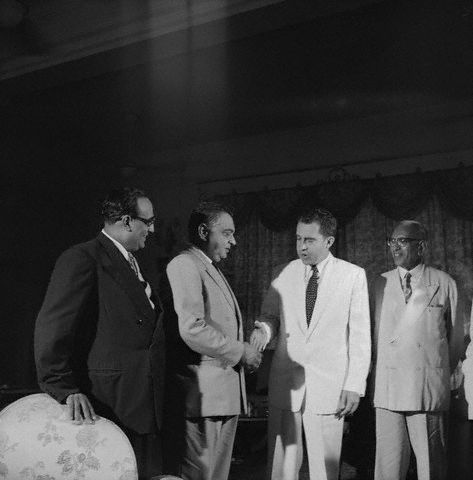<Back to Index>
- Mathematician Kollagunta Gopalaiyer Ramanathan, 1920
- Writer Ignacio Manuel Altamirano Basilio, 1834
- 1st President of Pakistan Iskander Ali Mirza, 1899
PAGE SPONSOR


Major - General Sahibzada Sayyid Iskander Ali Mirza, CIE, OBE (Urdu: اسکندر مرزا) (November 13, 1899 – November 12, 1969) was the fourth and last Governor - General of the Dominion of Pakistan (6 October 1955 to 23 March 1956), and the first President of the Republic of Pakistan (23 March 1956 to 27 October 1958).
Iskander Ali Mirza was born at Murshidabad, Bengal, on 13 November 1899, the eldest son of Sahibzada Sayyid Muhammad Fateh Ali Mirza (1875 – 1948) and his first wife, Dilshad Begum (1879 – 1925). Muhammad Fateh Ali Mirza was a prince of the ruling house of Murshidabad and grandson of Nawab Mansur Ali Khan, the last Nawab of Bengal. Mirza was a descendant of Gaddar - e - Abrar Mir Jafar. He was a Shi'a Muslim, as his emblem displayed the sign of the Zulfiqar, the sword of Ali (son - in - law of Prophet Muhammad ). He grew up in Bombay. After completing his early education at Elphinstone College, of the then University of Bombay, he was educated at the Royal Military Academy at Sandhurst, becoming the first graduate from the Indian subcontinent at the academy, and was commissioned into the British Indian Army in 1920.
He was attached to the 2nd Battalion, Cameronians 16 July 1920, and served in the Khodad Khel Operations 1921 and at Waziristan 1924. He was transferred to the 17th Poona Horse (Queen Victoria's Own) later that year, and joined the Indian Political Service in
1926. He was Assistant Commissioner at Abbottabad 1926 - 1928, Bannu
1928 - 1930, Nowshera 1930 - 1933, and Tank 1933, a Deputy Commissioner at
Hazara 1933 - 1936 and at Mardan 1936 - 1938. He was a Political Agent
Khyber 1938 - 1940, Deputy Commissioner Peshawar and Political Agent to
the Mohmands 1940, Political Agent Orissa States 1945 - 1946, Joint
Defence Secretary India 1946 - 1947 and Defence Secretary. Mirza only
served in the army for six years, after which he was the first Indian to
be accepted in the elite Indian Political Service,
eventually becoming a joint secretary in the Ministry of Defence of
British India. In this position, he was responsible for dividing the
British Indian Army into the future armies of Pakistan and India.
Upon the formation of Pakistan, Mirza — at the time, the highest ranking Muslim civil servant in the nation — was made the Defence Secretary of the new nation. In 1954, he was made governor of East Pakistan to bring order to the politically distressed region. This position was followed by his being appointed Minister of Interior and Frontier Regions in Muhammad Ali Bogra's cabinet. In 1955, he became acting Governor - General, before becoming the last Governor - General of Pakistan.
Mirza was also a great advocate of the One Unit scheme, and believed in the separation of state and religion. When Mirza succeeded the ailing Malik Ghulam Muhammad as Governor - General, he was married to his second wife, Nahid Mirza, an Iranian lady who had previously been the wife of the Military Attaché of Iran in Pakistan.
In 1956, Pakistan established its first constitution, and the position of Governor - General was replaced by that of President.
The two were essentially the same, but Mirza was officially elected as
President by the Assembly. During his presidency, Pakistan was
politically unstable, this was marked by four different prime ministers
in two years.
In 1958, Mirza decided that the 1956 Constitution was contributing to political instability; on 7 October, he declared martial law with the view to introducing a new constitution "more suited to the genius of the Pakistani people" in November, as he believed democracy was unsuited to Pakistan "with its 15% literacy rate" (although the same problem of low literacy also existed in India which had opted for democracy). He appointed the commander - in - chief of the Pakistan Army, Ayub Khan, as the martial law administrator, which proved his undoing.
Ayub Khan declared himself President on 27 October after a bloodless coup d'état, and Mirza was exiled to London.
On 24 November 1922, Iskander married Rif'a'at Begum (1907 - 23 March 1967). The couple had two sons and four daughters. In October 1954, Iskander married Iranian born Naheed Begum (1914 -), the couple had no children.
Mirza lived in exile in London until
his death. He died of a heart attack in London on 12 November 1969, the
day before his 70th birthday. It is reported that Mirza struggled
financially while living in London. After Yahya Khan's military government refused to allow him to be buried in his own country, his body was flown to Tehran where the Shah of Iran gave him a State Funeral.
Mr. Chundrigar is now Prime Minister and I hope the present Government will continue until general election in November 1958. I am quite sure there will be a new President in the new set - up. I am tired of trying to keep the country on the rails and wish all the luck to my successor. With 15% literacy we are trying to run a Constitution which requires 70% literacy - This is the basis of all our troubles. I trusted the Army and in Military honour of General Ayub khan. This was an error of judgment, and people who got on top and misjudge as I did have no right to complain and deserve what they get. This is the end of an episode as far as I am concerned. Individuals don't count, it is the country which matters.
Signed I.A.M.